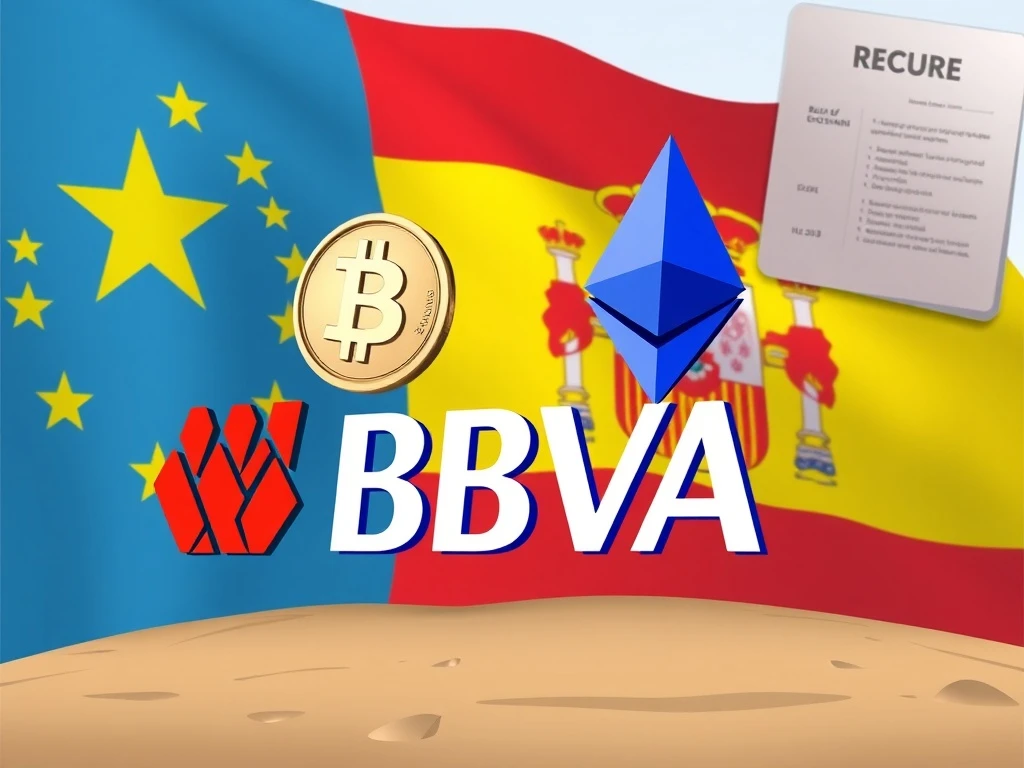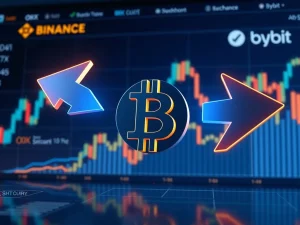BBVA Crypto Access: Spain’s Revolutionary Step in Bank-Backed Digital Assets

Are you a crypto enthusiast in Spain, or simply curious about how traditional banking is finally embracing the digital asset revolution? Get ready for a game-changer. BBVA, one of Europe’s leading financial institutions, has taken a monumental leap by expanding its BBVA Crypto services directly to retail customers in Spain. This isn’t just another crypto exchange; it’s a major bank integrating digital assets into its core offering, signaling a new era for how we interact with cryptocurrencies. This move is poised to reshape the landscape of digital asset adoption, making crypto more accessible and seemingly more secure than ever before.
What is BBVA’s Game-Changing Bank Crypto Service?
On July 4, 2025, BBVA officially launched its crypto trading and custody service for retail customers across Spain. This landmark initiative makes BBVA the first traditional bank in the country to offer such a comprehensive service under the European Union’s pioneering MiCA regulations. It’s a significant milestone, transforming how everyday investors can engage with digital assets.
BBVA’s Bank Crypto Services are designed with simplicity and integration at their core. Instead of requiring users to navigate complex third-party exchanges or manage separate wallets, BBVA has seamlessly woven its crypto offering directly into its existing mobile banking application. This means you can buy, sell, and hold Bitcoin (BTC) and Ether (ETH) right alongside your traditional bank accounts, creating a unified financial experience. Here’s a closer look at what this service entails:
- Direct Integration: The crypto service is built into the standard BBVA mobile banking app, eliminating the need for separate downloads or platforms.
- Supported Assets: Currently, the service supports trading and custody for Bitcoin (BTC) and Ether (ETH), the two largest cryptocurrencies by market capitalization.
- Bank-Grade Custody: BBVA handles the custody of your digital assets internally, offering a level of security and oversight akin to traditional bank holdings. This means no more worrying about private keys or seed phrases for basic trading.
- Seamless Fund Movement: Users can easily fund their crypto accounts with euros directly from their existing BBVA accounts, simplifying the process of entering and exiting the crypto market.
- Self-Directed: It’s important to note that BBVA provides the platform for trading and custody but does not offer investment advice or recommendations. This is a self-directed product.
- Focused Scope: The service intentionally focuses on core trading and storage, deliberately excluding more complex functionalities like DeFi protocols, staking, or lending features.
This native offering from a major European bank is a clear attempt to demystify crypto, making it feel more familiar, secure, and compliant for a broader audience.
Who Can Access This New World of Bitcoin and Ether Trading?
The accessibility of BBVA’s crypto offering marks a significant expansion from its earlier, more limited pilot projects. As of its launch, the Bitcoin Ether Trading service is available to all Spanish residents aged 18 and older who hold a BBVA bank account. This is a considerable shift from previous initiatives, which were often restricted to private banking clients or foreign subsidiaries in markets like Switzerland and Turkey.
Accessing the service is designed to be straightforward, emphasizing user convenience. Here are the general steps involved:
- Open the BBVA Mobile Banking App: Start with the app you already use for your everyday banking.
- Navigate to Crypto: Look for a dedicated crypto tab or section within the investment or financial services area.
- Verify Identity: Complete standard Know Your Customer (KYC) procedures, which are typically streamlined for existing BBVA customers.
- Fund Your Account: Easily transfer euros from your main BBVA account to your new crypto account.
- Trade BTC and ETH: Buy or sell Bitcoin and Ether directly within the app’s intuitive interface.
- Secure Custody: Your crypto holdings are held in bank-grade custody, managed and secured by BBVA.
- Monitor Performance: View your crypto portfolio’s performance and transaction history alongside your other traditional accounts, providing a holistic financial overview.
For individuals who are risk-averse or new to digital assets, this integrated approach significantly lowers the barrier to entry. There’s no need to download separate applications, manage complex external wallets, or navigate the intricacies of unfamiliar exchanges. It’s about bringing crypto into a trusted, familiar environment.
MiCA Regulation: Spain’s Pivotal Role in European Crypto Adoption
BBVA’s retail crypto launch is perfectly timed with a crucial development in European regulatory clarity: the Markets in Crypto-Assets Regulation (MiCA). This groundbreaking regulation, which largely took effect in 2024, provides a harmonized framework for crypto assets across all EU member states. For financial institutions like BBVA, MiCA offers the much-needed legal certainty to offer regulated crypto products.
The Spanish financial regulator, the CNMV (Comisión Nacional del Mercado de Valores), granted its approval for BBVA’s compliance with MiCA Regulation in March 2025. This authorization empowers BBVA to legally offer custody, trading, and investment services for specific crypto assets within Spain. This swift regulatory backing positions Spain as a frontrunner in implementing MiCA’s harmonized rules, distinguishing it from several neighboring EU countries:
- France: While the AMF began accepting MiCA license applications on July 1, 2024, and has a transitional regime for existing firms, traditional banks are still in pilot phases and have yet to receive full operational authorizations for retail crypto services.
- Germany: BaFin approved its first MiCA licenses for specialized crypto firms in early 2025, but major German banks like Deutsche Bank and the Sparkassen group are not anticipated to launch retail crypto services until 2026.
- Italy: Italy implemented its MiCA framework in September 2024, requiring crypto firms to apply for authorization by mid-2025. However, no significant Italian banks have yet introduced retail crypto services.
- Portugal: MiCA became active across all EU member states in Portugal by December 2024, but local regulatory bodies are still in the process of establishing detailed licensing procedures, delaying widespread retail bank adoption.
Spain’s proactive approach, not only in swiftly implementing MiCA but also in empowering leading banks like BBVA to act decisively, signals its ambition to become a key crypto-finance hub within the EU. This regulatory clarity fosters innovation while prioritizing investor protection, giving Spain a competitive edge in the rapidly evolving European digital asset market.
BBVA’s Global Journey: From Switzerland to Spain’s Crypto Hub
BBVA’s foray into retail crypto in Spain isn’t an impulsive decision; it’s the culmination of a cautious and deliberate strategic roadmap that has unfolded over several years. This phased expansion reflects a measured approach to understanding and integrating digital assets into its global operations.
The timeline of BBVA’s crypto expansion highlights its careful progression:
- June 2021: Switzerland: BBVA made its initial move into crypto by offering Bitcoin trading and custody to private banking clients through its Swiss division, taking advantage of Switzerland’s early and more developed crypto regulations. The Swiss branch has since expanded its offerings to include Ether and the USDC stablecoin.
- January 2025: Turkey (Garanti BBVA Kripto): BBVA’s Turkish subsidiary launched a dedicated crypto trading platform for local users under a separate brand, further diversifying its experience in different regulatory environments and market demands.
- July 2025: Spain (Retail Launch): The current launch represents the most significant step yet, bringing crypto into the core BBVA banking experience for the broader retail market in Spain. This move is underpinned by the new MiCA framework.
With MiCA enabling the “passporting” of financial services across EU member states, BBVA’s July 2025 launch in Spain could serve as a crucial regulatory foothold. This allows for potential future expansion into other major European markets like France, Italy, and Germany, once their respective local licensing procedures are fully established. This strategic positioning solidifies Spain Crypto Regulation as a blueprint for wider EU adoption.
Unlocking the Future: Benefits and Limitations of BBVA’s Offering
BBVA’s crypto offerings are primarily focused on simplifying access while upholding stringent standards for security and regulatory compliance. For many users, especially those new to the space, these benefits are compelling:
- Enhanced Security: Your crypto assets are stored using BBVA’s internal custodial infrastructure, providing protections similar to those for traditional bank holdings. This mitigates risks associated with self-custody or less regulated exchanges.
- Unmatched Simplicity: The complex world of private keys, seed phrases, and external wallets is abstracted away. Users interact with crypto assets in the same familiar way they manage their fiat currency accounts.
- Robust Regulatory Protection: As a MiCA-compliant provider, BBVA is subject to significant legal obligations regarding disclosures, capital reserves, and data security, offering a layer of consumer protection not always found in the broader crypto market.
- Effortless Access: The ability to trade and store crypto directly within BBVA’s existing app eliminates the need to rely on decentralized finance (DeFi) protocols, third-party wallets, or unregulated exchanges, streamlining the user journey.
This structure is particularly appealing for users who prioritize regulatory oversight and prefer to keep their digital assets within a familiar, bank-controlled environment. However, it’s crucial to understand that while BBVA’s entry is a significant milestone, the offering remains intentionally narrow in scope. The bank has chosen to prioritize simplicity, security, and regulatory alignment over competing with the vast feature sets of specialized crypto exchanges or DeFi platforms. This decision shapes the user experience and defines the target audience, but it also introduces limitations:
- No Investment Guidance: Users are solely responsible for their trading decisions. BBVA does not provide portfolio guidance, market analysis, or asset recommendations.
- Limited Altcoin Support: The platform currently supports only Bitcoin (BTC) and Ether (ETH). Stablecoins, emerging tokens, NFTs, and other cryptocurrencies are excluded from the service.
- No DeFi, Staking, or Lending Features: Users cannot earn yield on their holdings, participate in decentralized finance protocols, or engage in lending activities. The service is strictly focused on basic trading and secure custody.
These limitations reflect BBVA’s cautious, compliance-first approach to crypto integration, aiming to provide a safe on-ramp rather than a comprehensive crypto ecosystem.
Navigating the Digital Frontier: Risks and Key Considerations for Crypto Investors
While BBVA’s entry into crypto services provides a more secure and regulated environment for retail investors, it’s vital to remember that it does not eliminate the inherent risks associated with digital assets. Users should approach this service as a convenient gateway into crypto, not as a substitute for fully understanding the asset class or its limitations. Being informed is your best defense against potential pitfalls.
- Market Volatility: Bitcoin and Ether remain highly volatile assets. Their prices can experience significant fluctuations within hours or even minutes, leading to rapid gains or substantial losses. Even when facilitated by a bank, this fundamental market instability remains unchanged.
- Regulatory Shifts: Although BBVA’s service complies with MiCA and Spain’s CNMV, the regulatory landscape for crypto is still evolving. Future updates at the national or EU level could alter the scope of offerings, introduce new compliance requirements, or restrict access to certain services.
- Custody Limitations: Users do not directly control their private keys. All digital assets are held by BBVA on behalf of the user, meaning full ownership is custodial. This requires a high degree of trust in the bank’s security infrastructure and its internal policies.
- No Deposit Insurance: Unlike traditional bank deposits, crypto holdings are not protected under EU deposit guarantee schemes. If losses occur due to unforeseen operational issues or a catastrophic event affecting the bank’s crypto custody, recovery may be limited or non-existent.
Understanding these risks is paramount for any investor considering digital assets, regardless of the platform used.
Is BBVA Crypto Right For Your Investment Journey?
Deciding whether to use BBVA’s crypto service versus a traditional crypto exchange largely depends on your individual investment goals, technical comfort level, and risk tolerance. BBVA offers a highly regulated, bank-integrated experience that prioritizes ease of use and security over a broad range of features.
You may find this platform ideal if you’re:
- New to crypto: Seeking a simple, bank-backed way to get started without diving into complex DeFi tools or self-custody.
- Security-conscious: Someone who values strong regulatory oversight and the consumer protections that come with a fully licensed, MiCA-compliant institution.
- A current BBVA customer: Looking for a seamless way to buy, sell, and store crypto, all from within the same app you already use for everyday banking.
However, it may be less suitable for:
- Diversified investors: Those seeking exposure to a broader range of digital assets beyond BTC and ETH, including altcoins or NFTs.
- Self-custody advocates: Users who want full control of their private keys and prefer to manage their own digital asset security.
- Advanced traders: Individuals looking for sophisticated trading tools, yield-generating products, or direct access to decentralized finance protocols.
Always remember that while regulation significantly improves safety and provides a framework for consumer protection, it doesn’t eliminate financial risk or guarantee protection against market losses. Diligence and education remain your most powerful tools in the dynamic world of cryptocurrencies.
Conclusion: A New Chapter for Crypto Adoption
BBVA’s expansion of its crypto services in Spain represents a pivotal moment for the integration of digital assets into mainstream finance. By leveraging the clarity provided by MiCA regulation and building on its prior experiences in Switzerland and Turkey, BBVA is making Bitcoin and Ether accessible to millions of retail customers within a familiar and regulated banking environment. This move not only lowers the barrier to entry for new investors but also sets a precedent for other traditional financial institutions considering their own crypto offerings across Europe. While the service is intentionally limited in scope, prioritizing security and simplicity, it signifies a profound shift in how banks perceive and interact with the crypto market. Spain, through BBVA’s pioneering efforts, is emerging as a key player in fostering regulated crypto adoption, paving the way for a more integrated financial future.









